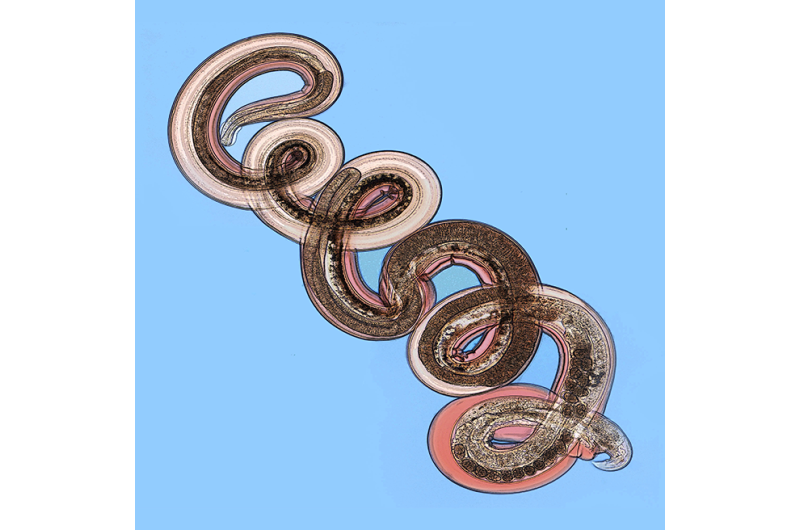June 8, 2016 weblog
Mice infected with a parasite show reduced symptoms of rheumatoid arthritis

(Medical Xpress)—A team of researchers working in Germany has found that intentionally infecting mice that had rheumatoid arthritis with a parasite, led to reduced symptoms of the immune disorder. In their paper published in the journal Nature Communications, the researchers describe their studies with test mice and the tiny worm-like parasite, Nippostrongylus brasiliensis and what they found by doing so.
Rheumatoid arthritis is a condition where the immune system, for unknown reasons, begins to attack the cartilage in different parts of body, most particularly, in the joints. The result is inflammation, pain and destruction of essential joint components. While some drugs have been developed to stop or slow the damage that occurs in patients with the disorder, most eventually succumb to its debilitating effects. In this new effort, the researchers have taken a different approach, introducing a parasite into the joints of arthritic mice to incite a secondary immune response, thereby redirecting the immune system attack, and saving the cartilage from damage.
N. brasiliensis normally infect rat guts, which prior research has shown initiates an immune response which results in a reduction of inflammation and tissue damage. Also, other prior has shown that an immune response to parasitic worms can help patients with other immune maladies, such as Crohn's disease. The researchers wondered might happen if the parasite were injected directly into different joints in mice that had been caused to have rheumatoid arthritis. They found that doing so caused an immediate immune response, and that the response led to lessened effort in attacking cartilage and subsequently less damage.
The researchers also noted that the type of immune response initiated by introduction of the parasite, known as Th2, was also present in the knee joints of 20 human patients suffering from rheumatoid arthritis, which they note, suggests that the body is already trying to defend itself against its own rogue immune response.
If the research continues to prove fruitful, the researchers believe, it might be possible to develop drugs that mimic the immune response set off by the presence of the parasites, thus kicking off a healthy immune response and lessoning the symptoms of the arthritic condition that adversely impacts millions of people around the world.
More information: Zhu Chen et al. Th2 and eosinophil responses suppress inflammatory arthritis, Nature Communications (2016). DOI: 10.1038/ncomms11596
Abstract
Th2–eosinophil immune responses are well known for mediating host defence against helminths. Herein we describe a function of Th2–eosinophil responses in counteracting the development of arthritis. In two independent models of arthritis, Nippostrongylus brasiliensis infection leads to Th2 and eosinophil accumulation in the joints associated with robust inhibition of arthritis and protection from bone loss. Mechanistically, this protective effect is dependent on IL-4/IL-13-induced STAT6 pathway. Furthermore, we show that eosinophils play a central role in the modulation of arthritis probably through the increase of anti-inflammatory macrophages into arthritic joints. The presence of these pathways in human disease is confirmed by detection of GATA3-positive cells and eosinophils in the joints of rheumatoid arthritis patients. Taken together, these results demonstrate that eosinophils and helminth-induced activation of the Th2 pathway axis effectively mitigate the course of inflammatory arthritis.
© 2016 Medical Xpress



















